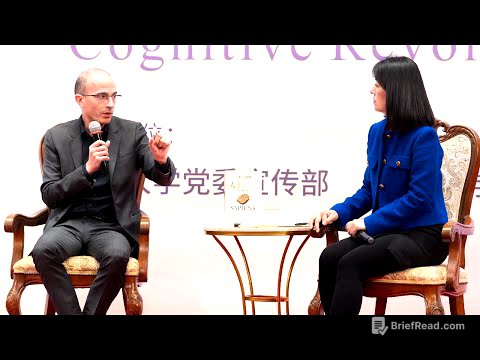TLDR;
Dr. William Li discusses the potential for the end of cancer through understanding and harnessing the body's natural defense systems. He highlights the importance of the immune system, gut microbiome, and angiogenesis (blood vessel control) in fighting cancer. He also touches on personalized cancer vaccines and lifestyle factors like diet and exercise.
- The body has hardwired health defense systems that can combat microscopic cancers.
- The gut microbiome, particularly the presence of acromancia muciniphila, can significantly impact the effectiveness of immunotherapy.
- Diet and lifestyle choices, such as consuming foods that promote acromancia growth, controlling angiogenesis, and maintaining a healthy body fat level, play a crucial role in cancer prevention and treatment.
- Personalized cancer vaccines that target the unique mutations in an individual's cancer are showing promising results in clinical trials.
Introduction: The End of Cancer is Coming [0:00]
Dr. Li expresses optimism about witnessing the end of cancer due to advancements in understanding how the body can heal itself. He has observed stage four cancer patients transition to stage zero through treatments that leverage the immune system. He emphasizes that the body's innate ability to defend itself against diseases like cancer is more powerful than pharmaceutical interventions alone.
The Role of Gut Bacteria in Immunotherapy [2:14]
A study comparing immunotherapy responders and non-responders revealed that the presence of the bacteria acromancia muciniphila was the key differentiator. Acromancia thrives in the colon's mucus and its presence can be boosted by consuming foods like pomegranate, cranberries, concord grapes, chili peppers, and Chinese black vinegar. Researchers were able to restore the immune response to kill cancer in mice who were not responding to immunotherapy by introducing acromancia.
The Body's Health Defense Systems [5:19]
The human body experiences around 10,000 mutations daily, each representing a microscopic cancer. The reason we don't constantly develop cancer is because of our body's health defense systems, which identify and eliminate these microscopic threats. When these systems fail, microscopic cancers can grow into dangerous tumors.
The Significance of Angiogenesis [7:33]
A one-centimeter breast cancer tumor contains one billion cancer cells and is fed by 100 million blood vessels. When a single blood vessel connects with a microscopic tumor, it can grow 16,000 times in size within two weeks. Boosting the immune system through diet, exercise, and lifestyle can strengthen the body's ability to eliminate microscopic cancers. Consuming anti-angiogenic foods like coffee and tea can help control blood vessel growth and starve cancers.
The Impact of Body Fat on Cancer Risk [10:34]
A Cornell University study on Swedish women found that those with excess body fat, even within a normal body size, had a three-fold increased risk of developing breast cancer. This is linked to higher inflammatory markers, as cancer thrives in an inflammatory environment. Excess visceral fat is associated with an increased risk of 14 different cancers due to the inflammation it causes. Visceral fat can compress organs and become hypoxic, leading to further inflammation.
Food as Medicine: Teas and Cancer Stem Cells [15:33]
Research at the Androgenesis Foundation revealed that Earl Grey tea was more potent than green tea in supporting healthy blood vessel function. Earl Grey's combination of black tea and bergamot may contribute to its benefits. Matcha, a polyphenol-rich tea, contains 100% of the tea leaf's polyphenols and dietary fiber, promoting gut health, metabolism, and reduced inflammation. Matcha has also been found to kill breast cancer stem cells in the lab. Purple potatoes, rich in anthocyanins, have been shown to kill colon cancer stem cells.
Angiogenesis as a Health Defense System [19:16]
Angiogenesis, the body's system for growing and maintaining blood vessels, is a critical health defense system. The 60,000 miles of blood vessels in the body deliver oxygen and nutrients to every cell. The endothelial layer lining blood vessels ensures smooth blood flow. Damage to this layer, caused by factors like hypertension or diabetes, can lead to cardiovascular disease. Angiogenesis is carefully controlled to prevent blood vessels from growing in unwanted areas, such as joints, eyes, or tumors.
Personalized Cancer Vaccines [21:29]
Sequencing both tumor and normal cells, then using AI to compare them, can identify the unique mutations driving a specific cancer. These mutations can be used to create a personalized protein, which is then injected to challenge the immune system. This process is similar to vaccination, training the immune system to recognize and attack the cancer. Clinical trials are underway, with promising results in treating glioblastoma, a deadly form of brain cancer.









